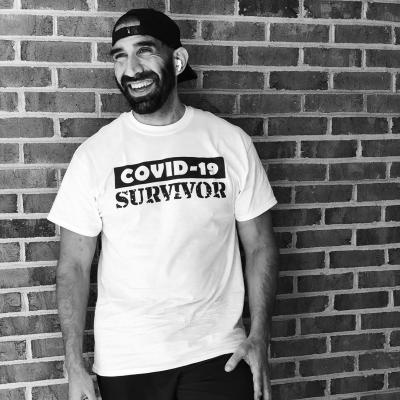40-year-old athlete Ahmad Ayyad loses 60 kilos in 25 days due to coronavirius
By Lokmat English Desk | Published: July 2, 2020 02:50 PM2020-07-02T14:50:14+5:302020-07-02T14:50:14+5:30

Shocking before and after photos of a strapping 40-year-old athlete who was placed in a coma for 25 days after testing positive for the coronavirus show how even the fittest people are having to fight for their lives when tackling the killer virus.

Ahmad Ayyad was 215lbs of muscle on a solid 6'1' frame prior to testing positive for COVID-19 on March 15. By the time he was discharged from the Johns Hopkins Hospital more than a month later on April 22, he had lost 60lbs.

'The day I woke up I was 153 pounds,' he explained in an interview on the hospital's website. 'My legs and arms were skinny and my chest was gone. I couldn't believe how hard it was to just get to the edge of the bed and stand.'

Prior to coming down with the coronavirus, the 40-year-old spent his time competing in challenging obstacle courses and spent hours doing weightlifting in D.C. area gyms and playing basketball.

When he wasn't working out, the fourth of nine children worked at his family's retail furniture business. Ayyad began feeling symptoms associated with the virus on March 11, just days after returning from a trip to Florida.

He attempted to recover by resting and eating shorbat adas - a lentil soup popular in the Middle East - but found that that did little to alleviate his symptoms.

By March 14, the athlete struggled to catch his breath and couldn't even bring himself to make the drive to his local hospital. A physician friend of Ayyad convinced him to Uber to the Sibley Memorial Hospital on the next day.

It was there that Ayyad tested positive for both COVID-19 and Influenza A. He was placed on a ventilation and transferred to Johns Hopkins as his breathing grew worse.

He became the hospital's third patient with coronavirus and the first to be placed on a ventilator, according to Dr. Natalie West. Dr. West was the pulmonary specialist who admitted Ayyad into the hospital.

Ayyad communicated by writing notes as he was unable to speak because of the ventilation tubes.

'We had a whole conversation with me talking and him writing,' West shared. 'The last thing he wrote on that piece of paper was, "Thank you so much for taking care of me." It brought tears to my eyes. He just seemed like a very sweet and kind person.'

But soon, Ayyad's fever sent him into a comatose state and he needed to have his breathing supported by a ventilator. Heavily sedated but delirious, he once removed his ventilation tube after growing agitated. After removing the tube a second time, doctors determined that he was feeling well enough to not need a tracheostomy. While he was in a coma, his parents would call every day to check in on their eldest son.























